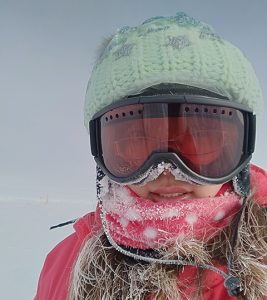This story was originally posted by WIPAC
IceCube collaborator and UW–Madison assistant professor of physics Lu Lu received a 2023 International Union of Pure and Applied Physics (IUPAP) Early Career Scientist Prize “for her contributions to the development of high energy neutrino astronomy in the PeV energy region.” Lu accepted the award on July 27 during the opening ceremony at the 38th International Cosmic Ray Conference (ICRC) held in Nagoya, Japan.

Early Career Scientist Prizes are given to early career scientists within each IUPAP commission who have up to eight years of postdoctoral research experience and have made significant contributions to the cosmic ray field. Lu is a recipient of the Early Career Scientist Prize in the Commission on Astroparticle Physics (C4).
Her PhD work focused on developing a novel technique to search for ultra-high-energy photons using data from the Pierre Auger Observatory. She also played a leading role in the initial design of the “Dual optical sensors in an Ellipsoid Glass for Gen2” (D-Egg), a two-PMT optical module for the IceCube Upgrade.
More recently, she made key contributions to the multimessenger correlation studies of the neutrino source candidate TXS0506+056 and to the detection of a particle shower associated with the hadronic decay of a resonant W boson.
Lu is currently an assistant professor of physics at the Wisconsin IceCube Particle Astrophysics Center (WIPAC) at the University of Wisconsin–Madison. Her current research focuses on diffuse high-energy astrophysical/cosmogenic neutrinos from TeV to EeV, Galactic PeVatron detection in the context of multimessenger observations, and the exploration of potential transient ultra-high-energy sources.
She is actively involved in IceCube outreach initiatives and has pioneered the development of an app that provides IceCube real-time alerts via augmented reality on mobile devices. Currently, she serves as co-lead of the diffuse science working group in IceCube and is one of three representatives of the physical science group of US-SCAR (Scientific Committee of Antarctic Research).
“I would like to express my deep appreciation for my collaborators and for those who work on foundational tasks such as reconstructions and calibrations, as their efforts behind the scenes make groundbreaking discoveries possible,” said Lu. “As early career scientists, we bear the responsibility of continuing and expanding experiments in the particle astrophysics field. We must collaborate and work together to ensure that the next generation of young scientists will have exciting discoveries to make.”